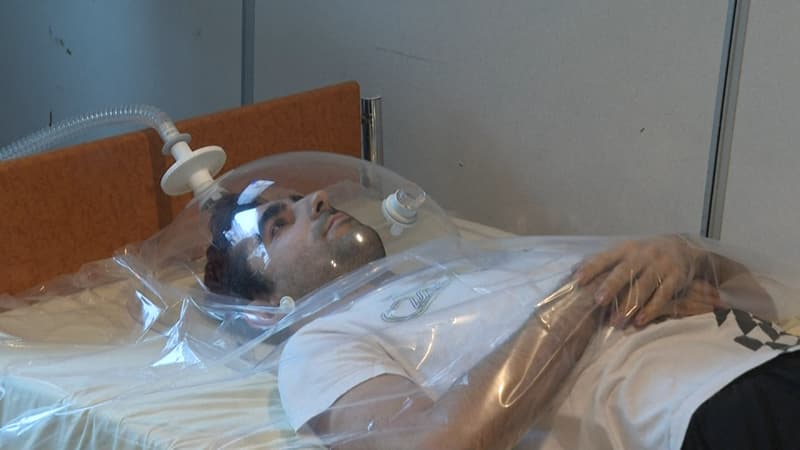Spend two months lying down to help space research: volunteers have agreed to remain in bed under surveillance in Toulouse, in order to recreate the absence of gravity and thus contribute to improving the living conditions of astronauts during their missions.
“We see ourselves losing weight day by day at first,” smiles Matthieu, one of the twelve men selected for this experiment, who has been well installed for five weeks at the Medes clinic, a health branch of the National Center for Space Studies. (CNES).
The bed of these volunteers, chosen from among 3,000 candidates and whose names are not disclosed, remains tilted for 60 days at an angle of -6 degrees, the most capable of reproducing the effects of weightlessness to which astronauts are subjected during their stays. in space.
“We have entered the phase of space exploration. We are really looking to go to the Moon and Mars, it is no longer fiction and it is about long-duration flights of two to three years”, explains Audrey Bergouignan, from the National Center for Scientific Research (CNRS).
“Exposure to microgravity will impact all physiological systems (…) and cause alterations that we are trying to understand and prevent,” specifies this research director, before adding: “To prevent them, we implement protocols that we tested here above. , before testing them in space.”
bike and centrifuge
Everything is therefore organized to allow the 12 hospitalized to remain in bed: almost a hundred people are mobilized to follow them for the duration of the study, from caregivers to researchers.
“We are in very favorable conditions for bed rest. Every time we need something, it is enough to call the medical staff,” explains Matthieu, a 39-year-old gardener who was convinced by his girlfriend to try the adventure, paid 18,000 euros for three months . of presence on the site.
To compare the evolution of their bodies as a function of their physical exercise, the volunteers are divided into three groups: one performs 30 minutes of recumbent cycling a day, the other does not undergo any physical activity, while the third must pedal while standing in a moving human centrifuge.
“The idea is to see if the artificial gravity that the centrifuge creates when it rotates improves the effects of the physical exercise of the bicycle,” specifies Marie-Pierre Bareille, head of the space clinic commissioned by CNES for the study and the European Space Agency. (THAT).
If the results are conclusive, this artificial gravity could be recreated aboard long-duration missions in space, once technical limitations are resolved.
Fifa and Mario Kart
“The challenge, he says, is getting crews fit and able to work during extravehicular outings,” during which they may have to perform quite physical tasks.
“During a trip to Mars, astronauts could lose up to 15% of their mass,” says Audrey Bergouignan.
The participants in the experiment take turns, sometimes on a bicycle designed for recumbent pedaling, sometimes in the centrifuge, while laughter breaks out with the caregivers who share their very particular daily life.
“I don’t get bored, everyone is very nice,” says Alejandro, a 26-year-old Spanish aeronautical engineer who lives in Toulouse.
“We are in contact with the other cameras. We organize video game tournaments on Mario Kart or Fifa ”, she laughs, while pedaling under the supervision of a trainer.
For them, the experience will end with an accompanied return to normal life at the beginning of July, while another 12 volunteers will undergo the same living conditions in 2024.
The clinic selected only men to “limit the variables” among the volunteers, according to the organizers, and to obtain the most “homogeneous” results possible.
But the conclusions of the study carried out in Toulouse will not only apply to the space field. “Knowledge of the hypersedentary lifestyle will be useful for everyone to know how a lack of physical activity acts on the body,” says Marie-Pierre Bareille, referring to the elderly or those suffering from pathologies such as osteoporosis. .
Source: BFM TV


